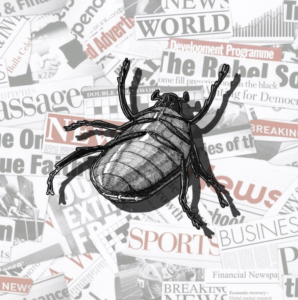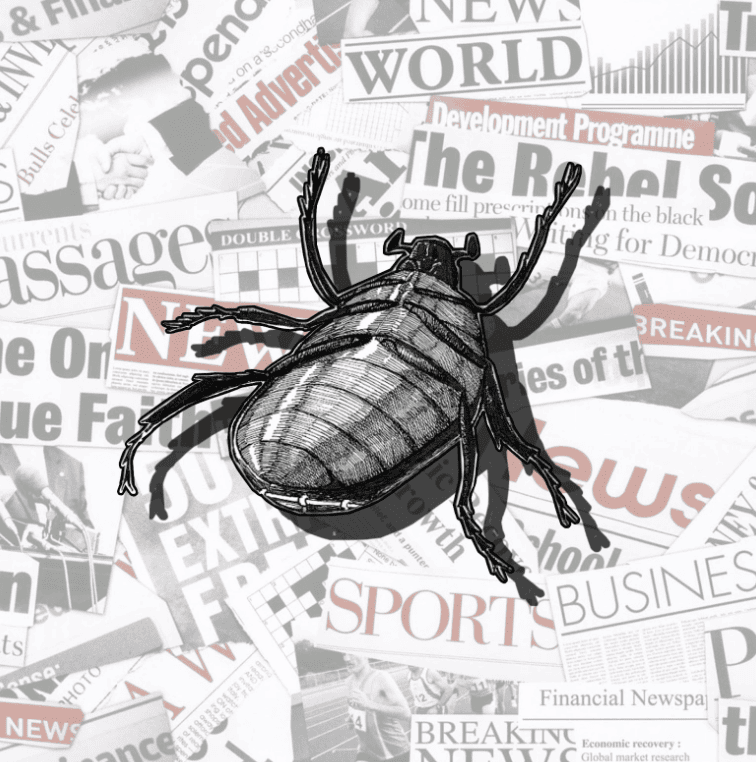
(Image manipulation done by me, background photo: https://www.ilovewallpaper.ie/wallpaper-c1/fleet-street-newspaper-wallpaper-black-white-red-102511-p649 )
Pictures of mothers clinging on to their dying children and grotesque photos of human carcasses lying on the side of the road seem to have the same effect on us as clickbait articles discussing celebrity cheating scandals. Residing in a stable environment free from direct violence and immediate crisis paradoxically leads to a diminished sense of sympathy for those that we feel are distant from us – whether due to cultural disparity, geographical separation, or the multitude of other concerns preoccupying the average person.
Such detachment may be similar to the feeling a certain author tried to convey whilst writing his novella about a traveling salesman who, one ordinary morning, discovers that he has transformed into a monstrous vermin. The need to pause and reread is inherent to both scenarios, drawing a parallel between our desensitization to crises and the disorienting absurdity in Franz Kafka’s literature.
The narrative of “The Metamorphosis” unfolds as Gregor grapples with the constraints of his newfound verminous state while simultaneously wrestling with obligations towards his family. Kafka uses a distinctive writing style, now commonly referred to as “Kafkaesque,” characterized by its absurdist, sinister, and bizarre storytelling. This style, prevalent throughout the author’s storytelling, reflects the oppressive and nightmarish qualities inherent in the author’s fictional worlds. The narrative strategically introduces an absurd situation for the protagonist from the outset, offering no explanation for Gregor’s metamorphosis. As Gregor’s story unfolds, readers find themselves continuously seeking logical reasons or subtle hints regarding the motives behind his metamorphosis. However, Kafka refrains from providing a definitive resolution, compelling the reader to grapple with, and ultimately accept, Gregor’s absurd new state – This deliberate narrative strategy forces readers to adopt a philosophy of absurdism in their attempt to navigate his storyline.
Such forced accommodation to absurdity is eerily similar to our feeling of numbness when reading daily news. On the BBC’s cover page, next to a headline about an imminent famine affecting 2 million people in Gaza, is another about “Bubble tea’s unique growth potential in the UK.” In a world saturated by a relentless stream of human suffering and death reported through various media outlets, an unsettling numbness takes hold. The constant barrage of distressing headlines, grotesque images, and shock-inducing stories has resulted in the emotional impact of each new crisis being seemingly dulled. The initial shock that once accompanied reports of human suffering around the world has given way to a disconcerting familiarity, creating a sense of detachment.
Continuous exposure to such absurd situations starts shielding the reader’s psyche and creating something that gradually diminishes the initial emotional reaction to each new crisis and disaster. In the realm of Kafkaesque literature, absurd situations are not merely elements in the narrative; they become a force that demands the reader’s acceptance of such a reality. Similarly, the relentless influx of human suffering on the news, to a person privileged enough to be unaffected by such situations, compels us to adapt to a new sort of emotional normalcy – a kind of protective numbness. In both cases, there is a subtle shift in the reader’s perception, a gradual assimilation into a reality where absurd situations are not exceptions and shock-inducing stories, but facets of daily life.
However, there are more similarities between today’s politics and Kafka’s literature. In “The Metamorphosis,” the author sheds light on the indomitable human spirit. Whilst listening to his sister play the violin in his incurable verminous state, for example, Gregor expresses, “Was he an animal, if music could move him so?”, reminding the reader that his humanity still persists, even amidst all the absurdity.
Some might argue that what happens so far away from us is not our responsibility as individuals. However, this is not entirely true. Mobilizing your local community might have a larger impact than you assume. Following Russia’s assault on Ukraine, numerous volunteers, backed by collaborative networks both locally and internationally, have successfully mitigated humanitarian suffering on the ground. Even if you do not have financial or in-kind abilities to donate, just the simple act of caring contributes to a network of support for those who suffer from direct conflict and for those who have loved ones at risk on the ground.
Today, people need support and help more than ever. Amidst the climate crisis and a rapidly globalizing world, many countries and communities are experiencing a state of insecurity that has never been seen before. In the Democratic Republic of the Congo, crises have exposed millions of Congolese to conflict, political tensions, economic pressures, climate shocks, and persistent disease outbreaks. According to the International Rescue Committee, the country enters 2024 with over 25 million people in need of humanitarian assistance, which is more than any other country on earth. Across Ethiopia, droughts have depleted life for the past three years, in addition to a risk of large-scale fighting erupting between the Government and the Tigray People’s Liberation Front. Opposingly, Somalia is now facing widespread flooding – over 4 million people are said to be facing crisis levels of food insecurity amidst military strife driving civilian casualties and displacement. In South Sudan, civilians have experienced insecurity for over a decade with 72 percent of the population in need of humanitarian assistance, with tensions rising in anticipation of the December 2024 presidential election. Its neighboring country, Sudan, has also been pushed to the brink of collapse. In Gaza, Palestinians are crying out to the world trying to prevent the genocide of their people.
And despite the unprecedented crises, individuals and communities persevere in hope, displaying remarkable strength and resilience. This pliancy is a testament to the innate capacity of the human spirit to strive for a better future, a future where your life is not equated to numerical values or text on paper and on screen. Kafka, by exploring the juxtaposition of the individual against the immense, with absurd situations echoing a sense of helplessness experienced by his characters, shows us how his protagonists still seek connection and meaning to navigate the complexities of such a reality. Similarly, we should always seek a collective response in our crisis-ridden world.
To the desensitized mind, a hundred lives lost in an earthquake may seem small. To a person living in that situation, that may mean quite literally the end of the world – It may mean the loss of your mother, your father, your friend, or your partner. It may mean the loss of a home, a life, or reality as you know it. And now, as people are being killed, injured, and forced from their homes at a rate never seen since the Second World War, it is our responsibility to care, and to stand up for them. The resilience of the human soul, especially in the face of adversity, should not be forgotten. No matter if today’s death toll is ten or a million, we should not succumb to numbness.
Other posts that may interest you:
- The Trouble with ‘Ecocide’
- Carbon dioxide removal – hit or miss?
- Local Victories for Turkish Opposition — A Sign of Hope?
- Are France and Japan a Mismatch Made in Heaven?
- A Reflection on Dark Tourism
Discover more from The Sundial Press
Subscribe to get the latest posts sent to your email.





